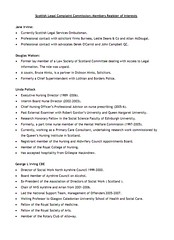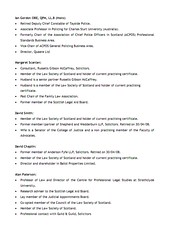After bringing the Scottish legal profession into widely accepted disrepute & disrespect, the Law Society of Scotland has instituted another of it's famous 'talking shop projects', with a 'consultation' on standards within the profession itself.
Of course, having the likes of a code of conduct where rules can apparently be varied on a case by case basis (resulting in even the most extreme offences committed by solicitors against clients being whitewashed), has never been good for the legal profession's image as many thousands of clients have found out over the years when trying to make a complaint against a 'crooked lawyer'.
Clients who are ruined by crooked lawyers have faced the spectre of making a complaint to even more lawyers who end up making sure those members of the public never get proper access to justice again .. and for what reason as these maligned clients have done nothing wrong other than protest against a lawyer ripping them off either financially or with poor legal service.
It should be a crime for a lawyer to rip off a client .. but it seems to be more of a crime for a client to report or complain against a crooked lawyer. How twisted is that ?
The Law Society of Scotland has made do with such advice as this imaginatively titled piece : "How the Law Society of Scotland can help you".
"Most people consulting a solicitor in Scotland will be fully satisfied with the service they receive. Occasionally, there is a problem and you may wish to register a complaint.
The Law Society of Scotland's Client Relations Office has a legal responsibility to handle complaints against Scottish solicitors. Our aim is to work with you to find the best solution to your complaint. We work to do that in a fair, thorough and impartial way"
Of course, that statement from the Law Society is complete rubbish and I have to wonder how the Law Society helped people in cases such as this :
The Corrupt Link Revealed - How the Law Society of Scotland manages client complaints & settlements.
The Law Society offers further advice here : What to do if you have a complaint
If you are having problems with a solicitor and you are the client, you need to raise your concerns with the firm in the first instance. Solicitors' firms have a Client Relations Partner or officer who will listen to your problem and try to resolve it. This is usually the quickest and most effective way of sorting out the problem.
You could contact the firm and ask for the name of the Client Relations Partner or contact the Law Society of Scotland's Client Relations Helpline on: 0845 113 0018 for that information.
Before considering a complaint to the Society, please make sure that you have done everything you can to resolve the matter directly with the firm"
Interesting .. but of course, another do-nothing rule, which has seen solicitors threaten clients families with physical assault in some cases, and even visits from the Police to clients houses on the back of 'anonymous tips' containing later proved false information.
Lawyers complaints system thought to have caused intimidation of clients for years
Soaring cases of complaints against Scottish Lawyers
Complaining against a lawyer ? You should expect a knock from the Police
So ... rather than try to resolve the matter with the crooked lawyers themselves, it might be wiser and safer to go to a newspaper and publicise everything before attempting even to make a complaint to the Law Society of Scotland ... or in the future, the Scottish Legal Complaints Commission.
So, if you want to participate in the Law Society's 'Standards Consultation', you can participate in it online here : Law Society Standards Consultation or you can download the * Standards Questionnaire (225k) (Word format version) and email it into the Law Society at : standards@lawscot.org.uk or send it to -
Standards Review
The Law Society of Scotland
26 Drumsheugh Gardens
Edinburgh
EH3 7YR
Finally, to add insult to injury, from the Law Society's website : "Client relations is a very important aspect of the Society's work. Consumer protection and quality of service are paramount. Most people who use the services of solicitors are satisfied with the service they receive. However, if you are dissatisfied, we view this matter very seriously"
They really do need to change some of that ... because no one believes it, especially when you get the likes of their Chief Executives pursuing clients and hounding them out of the justice system ... as happened here :
Law Society Chief Executive Douglas Mill lies to the Justice Committee over his relentless pursuit of clients of crooked lawyers :
Telling a bunch of crooked lawyers how they should improve regulating crooked lawyers might not do much good – and it hasn’t done any good so far, but by participating in the consultation, or publicising your woes with solicitors, it certainly gets more views across than the raft of pre-filled out forms which are apparently being sent in by ... lawyers !
Please note, comments for the time being are disabled, as I am working on a few stories and don't have time to keep checking in ....
Following is the Scotsman's take on the "Standards Consultation"
Those who want to wear badge of solicitor respond to new standards
By Jennifer Veitch
MORE than 100 responses have been received so far in the Law Society's flagship consultation to set new standards of service and behaviour for solicitors.
The regulatory body has produced draft guidelines on the appropriate standards of service and conduct that those who want to wear the "badge of solicitor" must uphold.
As well as updating the broad principles that all Scottish solicitors should follow, the review aims to clarify the level of service that the public can expect from lawyers.
The society hopes that the standards – which could be in place by the end of this year – will help to prepare the profession for the new complaints-handling system, due to begin when the new Scottish Legal Complaints Commission opens in October.
Clearer standards about service may help solicitors to communicate with clients and to manage expectations of the services that they will – and will not – provide. Recently, the Scottish Legal Services Ombudsman highlighted a lack of clarity surrounding the level of service offered to clients, particularly in conveyancing cases.
And, as competition is likely to increase following the vote in favour of moving towards alternative business structures, a new set of standards may also help to inform the public about the benefits of instructing a solicitor.
Philip Yelland, the society's head of regulation, said the standards would not offer a check-list for how solicitors should conduct their business, but should make expectations clearer for all concerned.
"We want to try to help clarify and make clearer for the users or potential users of legal services just what the standards they might expect are," he said. "In terms of service, we are going to be talking about very broad principles because every business does things slightly differently, but there are core issues in terms of service standards which need to dealt with.
He added: "What we are doing here is not producing a tick-list of things. We are trying to look at what's there and say: how can we improve this, how we can make it better so someone going in to a solicitor's office has a better understanding of what might happen?"
Yelland said he expected that the new standards would also help solicitors when faced with service complaints, soon to be dealt with by the new commission.
"The standards that will be set and the way they will be articulated will be very broad principles, and from that perspective if there is a complaint, I would expect the solicitor would have to show the commission – 'if that's the broad principle, this is how I met the broad principle'."
A group has been set up to develop the consultation, chaired by Dr Bronwen Cohen, chief executive of Children in Scotland.
Cohen has been keen to ensure that the review takes on board the views of vulnerable groups such as children and young people, and Yelland said further work to clarify standards for specialist legal services may arise from the consultation.
"There may be other things that flow out of this – for example, solicitors who are dealing with children," Yelland said.
"That is a very different market to dealing with adults. There are issues around language and the way you deal with them, and there may be things that fall out of the consultation that will enable us to look at particular areas and how we might deal with them differently."
The consultation responses will be reviewed over the summer with a final set of standards expected to be presented to solicitors at the society's Special General Meeting in September. If approved by the SGM, Yelland noted that the new standards could be in place by the end of the year.
"The reality is that what we are saying is not new – you could argue we are reviewing and restating and improving the wording on what people are already doing. But if there's part of the package that may become a practice rule, then that would need to be approved."
The new standards are being designed to work in tandem with existing rules on conduct and behaviour, in recognition of obligations not only to clients, but to the courts and the rest of the profession.
The draft standards on service are based on four broad principles – competence, communication, diligence and respect.
The standard of competence would require a solicitor to "know and apply the relevant law", "keep up-to-date" and "ensure that those to whom work is delegated are properly trained and supervised".
According to the draft standards, a solicitor would also have to consider "the nature and complexity" of any work, as well as whether he or she had the necessary knowledge and experience. Solicitors would also have to make an "ongoing commitment" to continuous professional development.
The communication standard would require solicitors to clearly explain and define services in letters of engagement, including costs and information on how complaints would be handled.
The standard on diligence would require the solicitor to "deliver on commitments, act in the best interests of each client, maintain and review systems of work and have prompt and transparent fee arrangements."
To uphold the standard on respect, solicitors would have to "treat each person as an individual" and "recognise diversity, different cultures and values".
Standards on conduct would reinforce the need for solicitors to be independent, giving advice "free from external influences or personal interests" and acting in the best interests of the client, balanced with their duties to the rest of the profession.
The draft conduct standards also cover conflict of interest, confidentiality, competence, communication and diversity.
Yelland added that he was pleased by the level of response to the consultation so far, but encouraged more lawyers and members of the public to take part in the consultation, which ends next Monday.
"The standards consultation is on the society's website, and we really want people – both solicitors and users of legal services – to fill it in. It looks at what is already in the Code of Conduct in terms of behaviour and the issues around service standards and asks people to confirm basically whether what we are thinking about saying is what they would expect.
• More information: www.lawscot.org.uk












